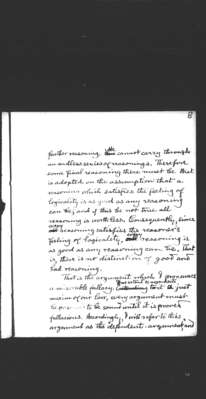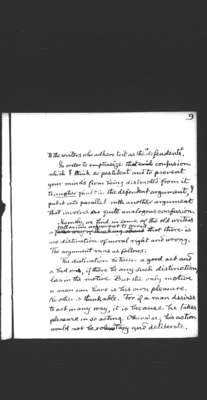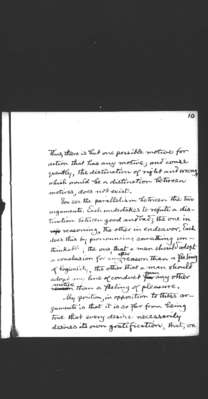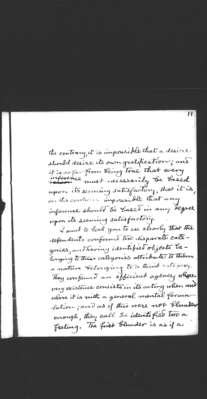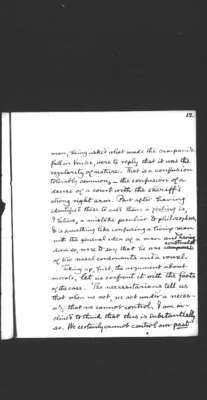Pages
11
further reasoning. He cannot carry through an endless series of reasonings. Therefore some final reasoning there must be that is adopted on the assumption that a reasoning which satisfied the feeling of logicality is as good as any reaosning can be; and if this be not true all reasoning is worthless. Consequently, since every reasoning satisfies the reasoner's feeling of logicality, every reasoning is as good as any reasoning can be. That is, there is no distinction of good and bad reasoning.
That is the argument which I pronounce a miserable fallacy. If we extend to arguments just maxim of our law, every argument must be presumed to be sound until it is proved fallacious. Accordingly, I will refer to this argument as the "defendent-argument," and
12
to the writers who adhere to is as the "defendents."
In order to emphasize that confusion which I think so pestilent and to prevent your mind's from being distracted from it to another fault in the defendent argument, I put it into parallel with another argument that involves one quite analogous confusion.
Namely, we find in some of the old writers a fallacious argument to prove that there is no distinction of moral right and wrong. The argument runs as follows:
The distinction between a good act and a bad one, if ther be any such distinction, lies in the motive But the only motive a man can have is his own pleasure. No other is thinkable. For if a man desires to act in any way, it is because he takes pleasure in so acting. Otherwise, his action would not be voluntary and deliberate.
13
10
Thus, there is but one possible motive for action that has any motive; and consequently, he distinction of right and wrong, which would be a distinction between motives, does not exist.
You see the parallelism between the two arguments. Each undertakes to refute a distinction between good and bad; one in reasoning, the other in endeavor. Each does this by pronouncing something unthinkable; the one, that a man should adopt a conclusion for any other reason than a feeling of logicality, the other that a man should adopt any line of conduct from any other motive than a feeling of pleasure.
My position, in opposition to these arguments is that it is so far from being true that every desire necessarily desires its own gratification, that, on
14
11
the contrart, it is impossible that a desire should desire its own gratification; and it is so far from being true that every inference must necessarily be based upon its seeming satisfactory, that it is, on the contrary impossible that any inference should be based in any degree upon its seeming satisfactory.
I want to lead you to see claerly that the defendents confound two disparate categories, and having identified objects belonging to these categories attribute to them a nature belonging to a third category. They confound an efficient agency whose very existence consists in its acting when and where it is with a general mental formulation; and as if this were not blunder enough, they call the identified two a feeling. Thr first blunder is as if a
15
12
man, being asked what made the campanile fall in Venice, were to replythat it was the regularity of nature. That is a confusion tolerably commmon, - the confusion of a degree of a court with the sheriff's strong right arm. But after having identifed hese to call then a feeling is, I believe, a mistake peculiar to philosophers. It is something like confusing a living man with the general idea of a man and having done so, were to say that he was constructed of two nasal consonants and a vowel.
Taking up, first, the argument about morals, let us confront it with the facts of the case. The necessitarians tell us that when we act, we act under a necessity that we cannot control. I am inclined to think that this is substantially so. We certainly cannot control our past
